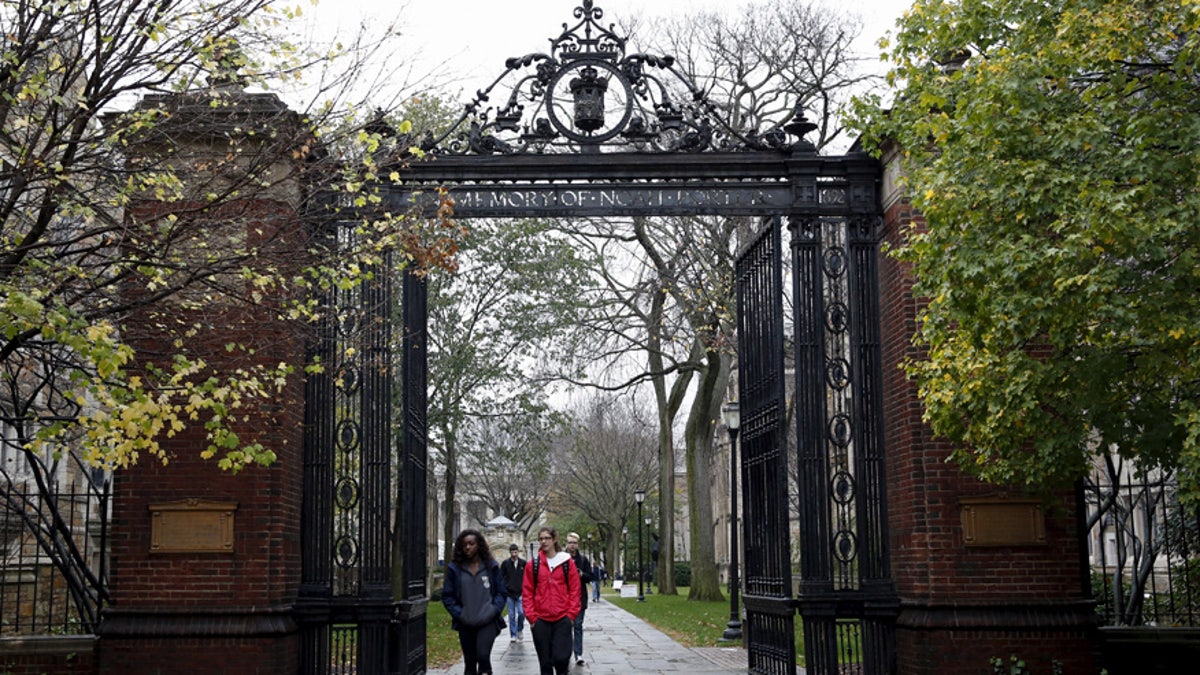
An early printed copy of Declaration of Independence is now on display at a Yale University library. (REUTERS/Shannon Stapleton)
Do you believe the foundational American rights are life, liberty and the pursuit of happiness? Maybe at one time, but no longer. Now it’s the right to express one’s pain and the duty to attend to the Pain Monster the lies within us.
And the oh-so delicate students at many colleges and universities across the country are eager to share their inner pain with all who will listen – and demand to be sheltered from anything that could cause yet more inner turmoil.
In times past, the college student who tells you of his pain for some imagined slight would have been scolded and mocked for his self-indulgent, bruised feelings. If you’re so thin-skinned, grow thicker skin, we’d have told him. Grow up. But we don’t talk like that anymore.
We’ve been sensitized and disciplined and sued when we talk like that. As a result we’ve grown the wobbliest and most spineless generation the country has ever seen. Bear in mind, I’m talking about the adults administrators and professors at America’s colleges, not the students. The students are just taking their cues from us. When they profit from our indulgence they show themselves braver than we are, if more malevolent.
Through our weakness, through our unwillingness to discipline infantilized behavior, we’ve created the Pain Monsters at Yale University, Middlebury College, Evergreen State College and a growing number of other colleges. We’ve signaled that they can behave as outrageously as they want, so long as they justify themselves by uttering the magic words: “I want to talk about my pain.”
There are few colleges and universities that coddle students more than Yale, and few where students are more privileged. Any 18-year-old accepted there should feel a tremendous sense of gratitude. For many, a Yale degree will open doors to prestigious graduate schools, high-paying jobs, and entry into the ranks of our nation’s wealthy and powerful elite.
But students soon learn better than to be grateful for their good fortune after arriving at Yale. Instead they’re taught to express their hatred for anyone in authority, for anyone who deviates in the slightest way from the latest progressive orthodoxies.
When the head of one residential college at Yale asked students to listen to other views, one of them yelled at him: “Why the f--- did you accept the position? Who the f--- hired you? You should step down!” When the college head patiently replied, the student answered: “You should not sleep at night! You are disgusting!” Students later complained that they were so traumatized by the college head that that they were having breakdowns.
Incidentally, until last year the title of heads of residential colleges at Yale was “master.” But that title – taken from the “ancient collegiate tradition” at Oxford and Cambridge Universities in England – was dropped because it “carries a painful and unwelcome connotation” to slavery and slave owners “that can be difficult or impossible for some students and residential college staff to ignore,” Yale announced in dropping the title.
At other colleges and universities, protesters told conservative speakers: “You’re killing us.” College Republicans were told: “Your existence is a disturbance.”
We see the same thing in the unhinged Trump Derangement protests. On the anniversary of last year’s election next month, tens of thousands of progressives plan to assemble in Boston Common “to scream helplessly at the sky.” I wouldn’t advise anyone to show up in a Make American Great Again cap.
“I want to talk about my pain,” said a student at a Yale protest. It’s easy enough to deride the silly things student protestors say, but I don’t want to deny that the pain was real. We have an infinite capacity to obsess over perceived slights, to turn them into the deepest psychological wounds, and to turn that into boundless hatred.
The interesting question is not whether the pain is real. Rather, the question is why we’re seeing more of it today than in the past. And the answer is because we’ve incentivized pain. We’ve let people know that pain, even idiotic, senseless pain, can be weaponized and employed against hated opponents, whether college teachers or local conservatives. And when you incentivize something, you get more of it.
The pain is real. But it is also strategic. What comes first is the desire to justify one’s hatred, for which the pain operates as a permission slip. It makes the protestor think his hatred noble, and lets him hug himself in self-delight for reveling in the most evil of emotions.
Colleges and universities are meant to be places of learning and intellectual growth, where old assumptions and ideas are challenged – not pain-free zones where delicate sensibilities are coddled and no one is exposed to disturbing or challenging ideas. That’s a lesson we’ve somehow forgotten.








































